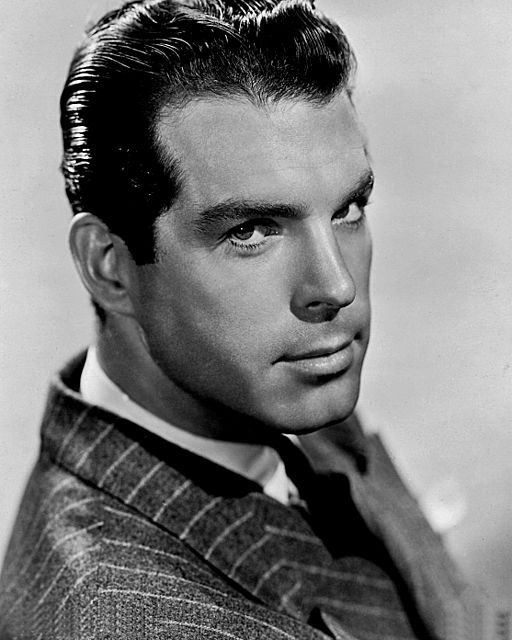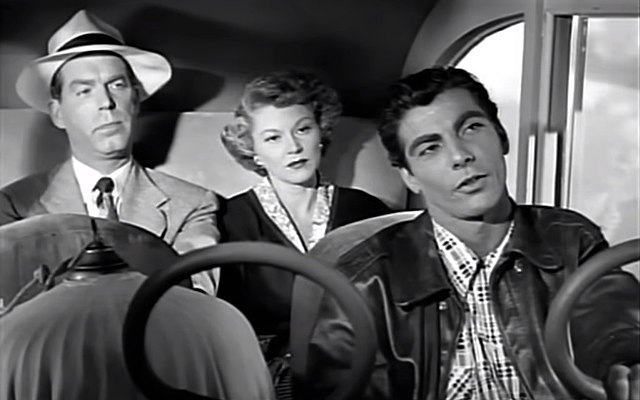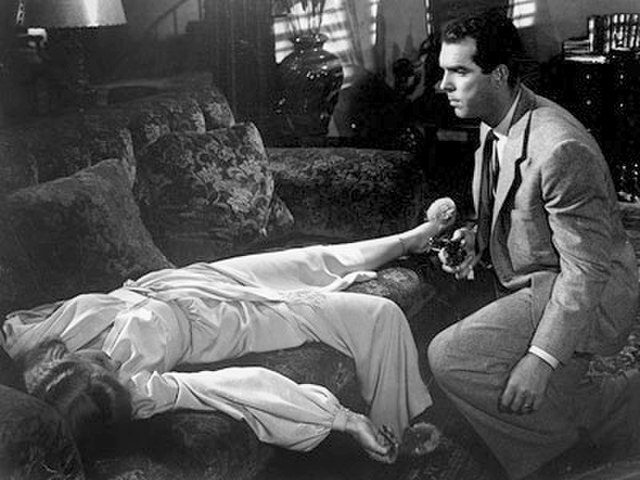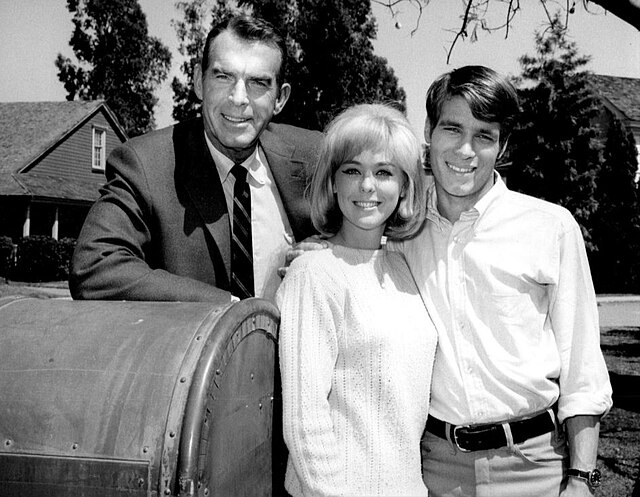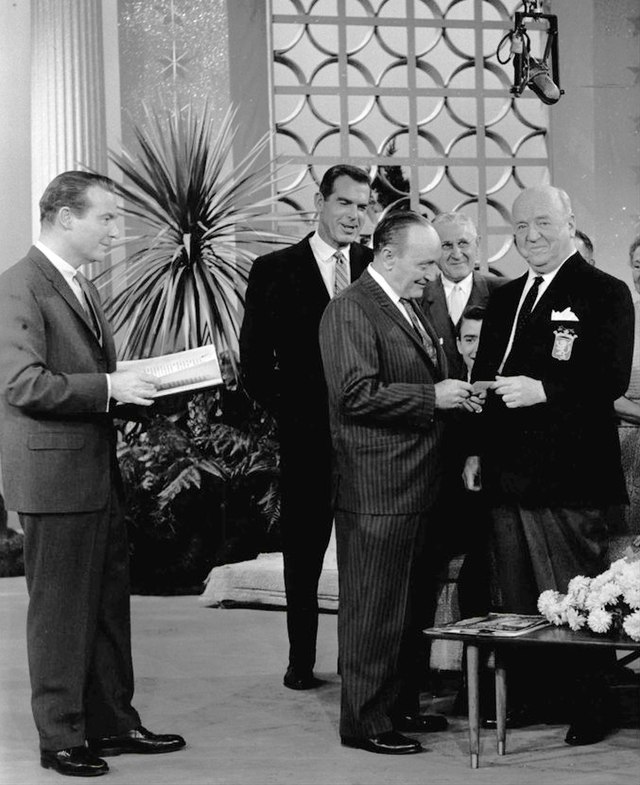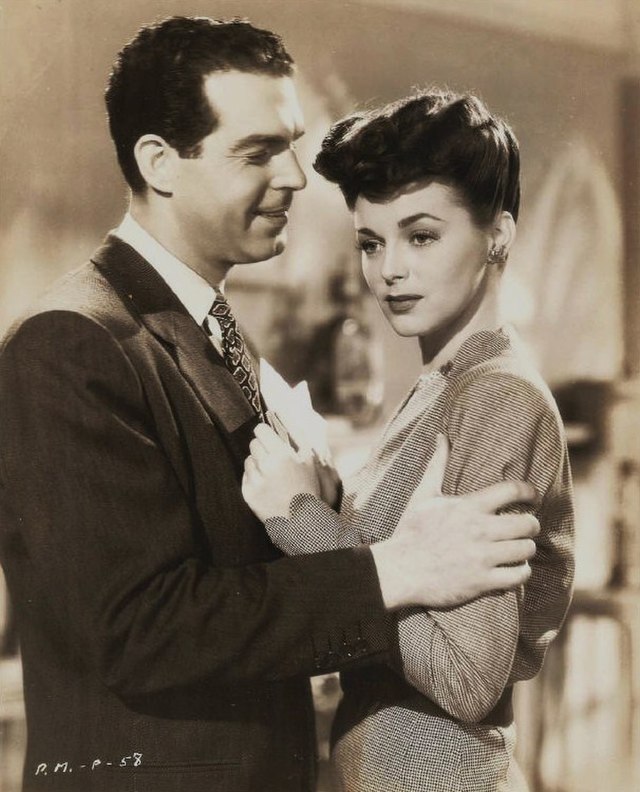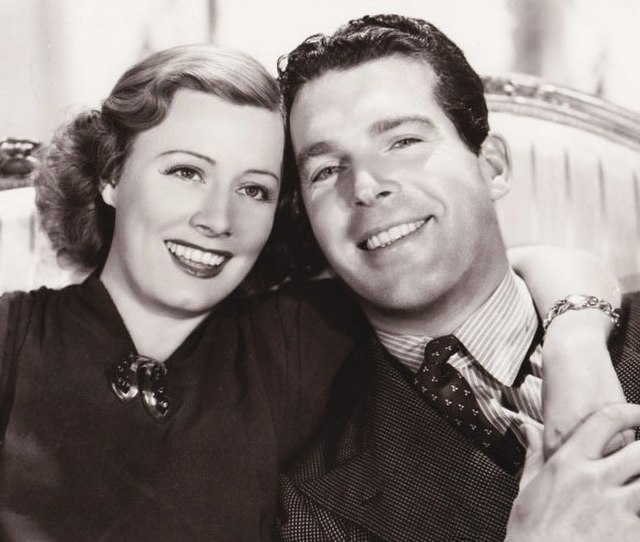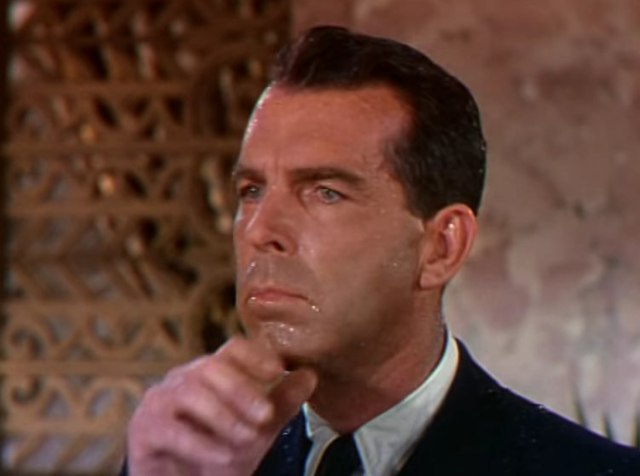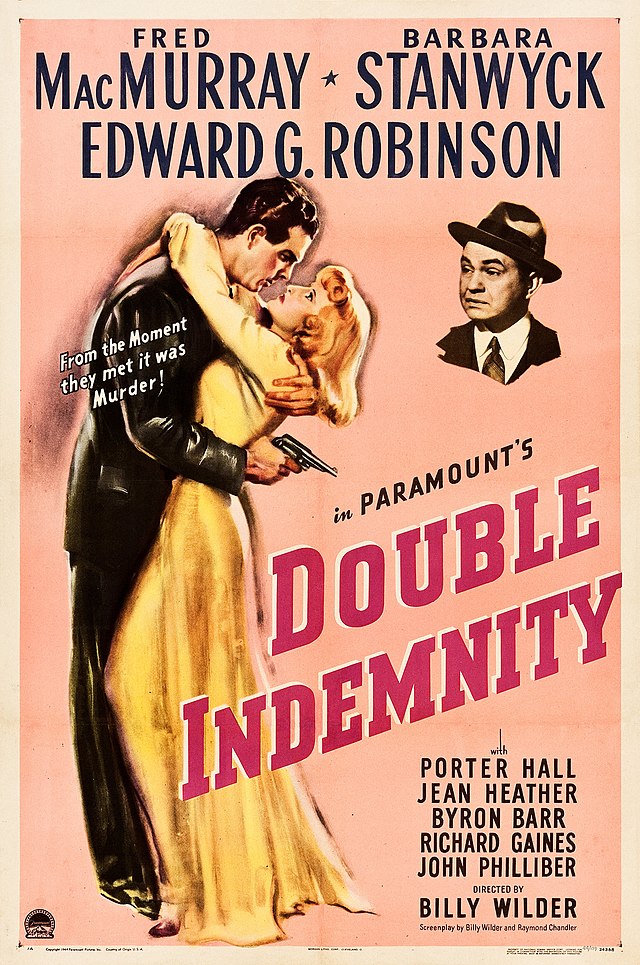Fred MacMurray
back| Full Name | Frederick Martin MacMurray |
| Stage Name | Fred MacMurray |
| Born | August 30, 1908 |
| Birthplace | Kankakee, Illinois, USA |
| Died | November 5, 1991 |
| Buried | Holy Cross Cemetery, Culver City, California, USA |
| Married to | Lillian Lamont (1936–1953, her death) - June Haver (1954–his death in 1991) |
| Children | Susan MacMurray, Robert MacMurray (adopted with Lillian Lamont), Katherine MacMurray, Laurie MacMurray (adopted with June Haver) |
| Notable films | Double Indemnity (1944) - The Caine Mutiny (1954) - The Apartment (1960) - My Three Sons (TV Series 1960 - 1972) |
Fred MacMurray
Hollywood's Everyman
Fred MacMurray (1908-1991) was a versatile American actor renowned for his roles in film noirs, comedies, and family films. MacMurray starred in over 100 films, with notable performances in "Double Indemnity" (1944), "The Caine Mutiny" (1954), and "The Apartment" (1960).
He also became a beloved TV figure as the patriarch in "My Three Sons" (1960-1972). Known for his everyman charm and understated acting, he effortlessly shifted between genres. Married to June Haver, he had four children.
Related
Fred MacMurray (1908 – 1991)
Biography and Movie Career
Fred MacMurray was born Frederick Martin MacMurray on August 30, 1908, in Kankakee, Illinois. He was the son of Maleta (née Martin) and Frederick Talmadge MacMurray. His family moved to Madison, Wisconsin, where he was raised. MacMurray attended Carroll College in Waukesha, Wisconsin, where he played saxophone in a local band to support himself.
MacMurray started his career in show business as a musician, playing the saxophone in various bands. He moved to Hollywood in the early 1930s and signed a contract with Paramount Pictures. His good looks and charm quickly made him a popular leading man.
Fred MacMurray became a major movie star in the 1930s and 1940s, known for his versatility in a wide range of genres. He starred in numerous comedies, dramas, and film noirs. Some of his most notable films during this period include "The Gilded Lily" (1935), "The Trail of the Lonesome Pine" (1936), and "No Time for Love" (1943).
One of his most acclaimed performances was in Billy Wilder's film noir "Double Indemnity" (1944), where he played an insurance salesman drawn into a murder plot by a femme fatale, played by Barbara Stanwyck. This role showcased MacMurray's ability to play darker, more complex characters and remains one of his most famous roles.
Later Career and Television:
In the 1950s and 1960s, MacMurray continued to have a successful film career, appearing in movies such as "The Caine Mutiny" (1954) and "The Apartment" (1960), in which he played a morally questionable corporate executive.
He also found success on television, starring in the popular sitcom "My Three Sons" from 1960 to 1972. The show was one of the longest-running sitcoms of the era and helped solidify MacMurray's status as a beloved television actor.
Personal Life:
Fred MacMurray married Lillian Lamont in 1936, and the couple adopted two children, Susan and Robert. After Lamont's death in 1953, MacMurray married actress June Haver in 1954, and they adopted two more children, Katherine and Laurie.
Later Years and Death:
MacMurray retired from acting in the 1970s but remained a beloved figure in Hollywood. He passed away from pneumonia on November 5, 1991, at the age of 83. He is buried in Holy Cross Cemetery in Culver City, California.
Fred MacMurray's career spanned over five decades, and he appeared in more than 100 films and numerous television episodes. He is remembered for his versatility as an actor, his memorable roles in both film and television, and his contributions to the entertainment industry.
Bob Hope talks about Fred MacMurray:
Analysis of Fred MacMurray’s Acting Style:
Fred MacMurray's acting style was marked by its versatility, natural charm, and an everyman appeal that made him a beloved figure on screen.
Versatility
One of the most striking features of Fred MacMurray's acting was his ability to move seamlessly between genres. Whether he was playing the romantic lead, a comedic character, or a morally ambiguous figure in a film noir, MacMurray brought a level of authenticity and depth to his roles. This adaptability allowed him to sustain a long and varied career in Hollywood.
Natural Charm and Relatability
MacMurray possessed a natural charm and ease that resonated with audiences. His demeanor was often warm and approachable, making him relatable to a wide range of viewers. This trait was particularly evident in his romantic comedies, where his chemistry with co-stars felt genuine and his characters were easy to root for.
Understated and Subtle Performances
MacMurray’s performances were often marked by their understated quality. He had a knack for conveying complex emotions and character nuances with subtle gestures and expressions rather than overt dramatics. This subtlety made his characters more realistic and engaging, allowing audiences to connect with them on a deeper level.
Moral Complexity
In roles such as Walter Neff in "Double Indemnity," MacMurray demonstrated his ability to portray morally complex characters. His performance in this film showcased his capacity to delve into the darker aspects of human nature while maintaining a sense of vulnerability and internal conflict. This ability to balance charm with a darker edge made his performances in film noirs particularly compelling.
Comedic Timing
MacMurray’s sense of timing and delivery in comedic roles was impeccable. He excelled in both physical comedy and witty banter, often playing the straight man to more eccentric characters. His work in films like "The Absent-Minded Professor" highlighted his ability to handle slapstick humor and situational comedy with finesse.
Strong Screen Presence
Fred MacMurray had a commanding screen presence that drew viewers in. He could dominate a scene without overshadowing his co-stars, maintaining a balance that allowed for strong ensemble performances. His presence was both reassuring and authoritative, traits that served him well in roles as diverse as fathers, businessmen, and military officers.
Emotional Range
MacMurray’s emotional range was broad, allowing him to effectively portray a wide array of characters. From the earnestness of a family man in "My Three Sons" to the conflicted and cynical executive in "The Apartment," he displayed a depth of feeling that added layers to his characters. His ability to switch between joy, sorrow, frustration, and love made his performances rich and multi-dimensional.
Professionalism and Work Ethic
MacMurray was known for his professionalism and strong work ethic. He brought a sense of reliability to his roles, consistently delivering strong performances regardless of the project's scale. This dedication not only earned him respect in the industry but also contributed to his long-standing career.
Awards and Recognition:
Golden Globe Awards
- Nominee: Best Actor in a Motion Picture – Comedy or Musical for "The Absent-Minded Professor" (1961)
Laurel Awards
- Winner: Top Male Comedy Performance for "The Absent-Minded Professor" (1962)
- Winner: Top Male Supporting Performance for "The Apartment" (1961)
- Winner: Top Male Supporting Performance for "The Caine Mutiny" (1954)
Photoplay Awards
- Winner: Most Popular Male Star (1949)
- Winner: Most Popular Male Star (1950)
- Winner: Most Popular Male Star (1954)
Walk of Fame
- Star on the Hollywood Walk of Fame: Fred MacMurray received a star on the Hollywood Walk of Fame in 1960, located at 6421 Hollywood Boulevard, recognizing his contributions to the film industry.
Academy Awards
- Although Fred MacMurray never received an Academy Award nomination, his work in film noir classics and comedies remains highly regarded by critics and audiences alike.
Other Recognitions
Disney Legends
- Disney Legend: In 1987, Fred MacMurray was honored as a Disney Legend, recognizing his significant contributions to Disney films such as "The Shaggy Dog" (1959), "The Absent-Minded Professor" (1961), and "Son of Flubber" (1963).
National Cowboy & Western Heritage Museum
- Golden Boot Award: Fred MacMurray received the Golden Boot Award in 1988, which honors actors, directors, and stunt performers who have made significant contributions to the Western genre in television and film.
Personal Quotes from Fred MacMurray:
- "I once asked Barbara Stanwyck the secret of acting. She said, 'Just be truthful - and if you can fake that, you've got it made.'"
- "I always thought I was good for the average picture, not the exceptional one. I’d do my best to keep the atmosphere honest and make the characters real."
- "I was lucky enough to have a long career. I did everything I wanted to do and more."
- "A career is wonderful, but you can't curl up with it on a cold night."
- "I never dreamed that Double Indemnity would be a success. I got the script and thought, 'This is the end of me.' I just didn't see myself as that guy."
- "The best thing about having a long career is you get to spend time with your family."
- "I didn't leave Hollywood. I left work. Work was never a good friend to me."
What Others said about Fred MacMurray:
Co-Stars and Directors:
- Barbara Stanwyck (Co-star in "Double Indemnity"):
"Fred was wonderful to work with. He was the consummate professional, always prepared and always kind. He made every scene we did together better."
- Billy Wilder (Director of "Double Indemnity" and "The Apartment"):
"Fred MacMurray is the best actor I ever worked with. He had a remarkable ability to convey complex emotions with a simplicity that was both powerful and subtle."
- June Haver (Actress and MacMurray's second wife):
"Fred was not only a talented actor but also a loving husband and father. He was the kind of person who brought light and joy into every room he entered."
- Henry Fonda (Co-star in "The Trail of the Lonesome Pine" and "The Lady Is Willing"):
"Fred was an actor’s actor. He had a natural ease about him that made everything he did on screen look effortless. He was also one of the nicest guys in Hollywood."
Industry Critics and Historians:
- Leonard Maltin (Film Critic and Historian):
"Fred MacMurray was one of Hollywood’s most versatile and underappreciated stars. He could do it all – comedy, drama, romance, and noir – and he did it all exceptionally well."
- Roger Ebert (Film Critic):
"Fred MacMurray had a unique ability to play both the hero and the heel with equal conviction. His performance in 'Double Indemnity' remains one of the greatest in film noir history."
- James Robert Parish (Film Historian):
"MacMurray’s talent lay in his everyman quality. He was relatable, genuine, and could draw audiences into any story with his straightforward approach."
Fellow Actors:
- Donald O'Connor (Actor and Dancer):
"Fred MacMurray was a joy to work with. He had a great sense of humor and was always very supportive of his fellow actors."
- Fred MacMurray’s colleagues on "My Three Sons":
"Fred was the heart of 'My Three Sons.' His warmth and sincerity made him the perfect TV dad, and he set a tone of professionalism and kindness on set."
Movies Starring Fred MacMurray:
1934
- "The Gilded Lily": A stenographer falls in love with a newspaper reporter and a British aristocrat, creating a complicated love triangle.
- "Friends of Mr. Sweeney": A political comedy about a newspaperman who helps a friend run for office.
1935
- "Grand Old Girl": A dedicated schoolteacher fights to reform the education system in her city.
- "Men Without Names": An undercover G-man infiltrates a gang of bank robbers.
- "The Bride Comes Home": A penniless socialite finds herself in a love triangle with two men.
- "Hands Across the Table": A manicurist and a penniless playboy fall in love despite their financial struggles.
1936
- "The Trail of the Lonesome Pine": The first outdoor Technicolor movie about a family feud in the Appalachian Mountains.
- "Thirteen Hours by Air": A mail pilot falls for a wealthy passenger, leading to adventure and romance.
- "The Princess Comes Across": An American actress pretending to be a princess gets involved in a shipboard murder mystery.
- "Suzy": A chorus girl marries a World War I aviator, only to find herself caught in a web of espionage and intrigue.
1937
- "Champagne Waltz": A musical comedy involving a jazz musician and a classical composer.
- "Maid of Salem": A historical drama about a romance set against the backdrop of the Salem witch trials.
- "Exclusive": A reporter uncovers a political scandal that puts him in danger.
- "Swing High, Swing Low": A romantic drama about a cabaret singer and a trumpet player whose relationship is tested by war.
1938
- "Cocoanut Grove": A bandleader and his girlfriend navigate the music industry and personal challenges.
- "Men with Wings": The story of the development of aviation, seen through the eyes of two friends.
- "Sing You Sinners": Three brothers try to make a living in the entertainment industry, facing various personal and professional challenges.
1939
- "Cafe Society": A romance about a socialite and a reporter navigating New York's high society.
- "Invitation to Happiness": A prizefighter and his wife struggle to balance his career and their marriage.
- "Honeymoon in Bali": A successful career woman falls in love and must choose between her job and marriage.
- "Remember the Night": A prosecutor and a shoplifter fall in love during a Christmas trip home.
1940
- "Too Many Husbands": A woman finds herself legally married to two men, creating a comedic dilemma.
- "Rangers of Fortune": Three outlaws try to go straight and help a young girl save her ranch.
- "The Lady Is Willing": A Broadway actress adopts a baby and persuades a doctor to marry her for the child's sake.
1941
- "One Night in Lisbon": An American war correspondent and a woman get involved in espionage in Lisbon.
- "New York Town": A romantic comedy about a man and a woman who meet and fall in love in New York City.
- "Dive Bomber": A drama about Navy pilots and their struggles with aviation medicine.
1942
- "Take a Letter, Darling": A secretary and her boss navigate a business trip and unexpected romantic feelings.
- "The Forest Rangers": A love triangle set against the backdrop of forest fire-fighting efforts.
1943
- "No Time for Love": A photojournalist and a construction worker fall in love amidst various comedic misunderstandings.
- "Flight for Freedom": A fictionalized account of a female aviator inspired by Amelia Earhart's disappearance.
1944
- "Standing Room Only": A romantic comedy about a couple who pretend to be servants to find a place to stay during a housing shortage.
- "Double Indemnity": A film noir about an insurance salesman and a housewife who conspire to murder her husband for insurance money.
1945
- "Where Do We Go from Here?": A fantasy musical about a man who travels through time seeking love and adventure.
- "Captain Eddie": A biographical film about World War I ace pilot Eddie Rickenbacker.
- "Murder, He Says": A comedy-mystery about a man who stumbles upon a family with a hidden treasure.
1946
- "Pardon My Past": A man is mistaken for a wealthy man's long-lost nephew, leading to comedic situations.
- "Smoky": A western about a cowboy and his relationship with a wild horse.
1947
- "The Egg and I": A comedy about a city couple who move to the country to run a chicken farm.
1948
- "On Our Merry Way": An anthology film featuring various stories about people's lives.
- "Sing You Sinners": Re-release.
- "An Innocent Affair": A man suspects his wife of infidelity, leading to humorous misunderstandings.
- "Family Honeymoon": A newlywed couple's honeymoon is complicated by the presence of the wife's three children.
1949
- "Father Was a Fullback": A football coach struggles to balance his career and family life.
1950
- "Borderline": A romantic adventure about two undercover agents trying to bust a drug-smuggling ring.
- "A Millionaire for Christy": A secretary tries to win the heart of a wealthy man, leading to comedic situations.
1951
- "Callaway Went Thataway": A comedy about two television executives who search for a look-alike of a Western star.
- "Never a Dull Moment": A musical comedy about a city girl who marries a rancher and moves to the country.
1952
- "Fair Wind to Java": An adventure film about a sea captain searching for a sunken treasure in the Dutch East Indies.
1953
- "The Moonlighter": A western about a man seeking revenge after being wrongfully imprisoned.
1954
- "Pushover": A film noir about a detective who falls for a bank robber's girlfriend.
- "The Caine Mutiny": A naval drama about a mutiny on a World War II minesweeper.
1955
- "The Far Horizons": A historical film about the Lewis and Clark Expedition.
- "The Rains of Ranchipur": A drama about a British couple's experiences in India during a catastrophic flood.
1956
- "There's Always Tomorrow": A drama about a married man who rekindles a romance with a former flame.
- "Gun for a Coward": A western about a family dealing with a cowardly brother.
1957
- "Quantez": A western about a group of outlaws hiding in a ghost town.
1958
- "Day of the Badman": A western about a judge who must confront a gang seeking to free their leader.
- "Good Day for a Hanging": A western about a town marshal facing a moral dilemma over an execution.
1959
- "Face of a Fugitive": A western about a man wrongfully accused of murder trying to clear his name.
1960
- "The Apartment": A comedy-drama about an insurance clerk who lets his superiors use his apartment for extramarital affairs.
1961
- "The Absent-Minded Professor": A comedy about a professor who invents a gravity-defying substance called "flubber."
1963
- "Son of Flubber": A sequel to "The Absent-Minded Professor," continuing the professor's adventures with flubber.
- "Follow Me, Boys!": A family drama about a man who becomes a scout leader and positively impacts the lives of boys in his community.
1964
- "Kisses for My President": A comedy about the first female President of the United States and her husband's struggles with his new role.
1965
- "The Happiest Millionaire": A musical about an eccentric millionaire and his daughter's romance.
1966
- "The Absent-Minded Professor" (re-release).
1967
- "The Happiest Millionaire" (re-release).
1968
- "The Shakiest Gun in the West": A comedy western about a timid dentist who becomes a hero by accident.
1969
- "Charley and the Angel": A comedy about a businessman visited by an angel who tells him he has limited time to fix his family relationships.
1973
- "Charley and the Angel" (re-release).

